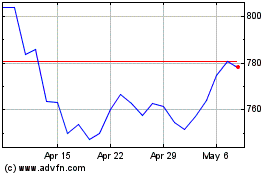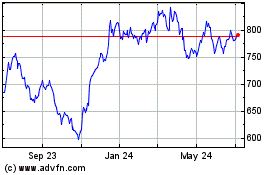BlackRock Favors U.S. Treasurys Over Other Nations' Amid Policy Pause -- Update
December 10 2019 - 5:38PM
Dow Jones News
By Daniel Kruger
The world's largest money manager is favoring U.S. Treasurys
over other sovereign bonds because it expects yields outside the
U.S. to linger near recent lows.
Treasurys yield more than government debt from other developed
markets, which should support their value if the pace of global
growth picks up next year, BlackRock Inc. asset managers said
Tuesday at a media presentation.
Global growth could accelerate next year after central banks
around the world -- including in the Federal Reserve, the European
Central Bank and the People's Bank of China -- took steps to lower
rates and boost growth in the face of a world-wide slowdown,
BlackRock managers said.
BlackRock prefers short-term Treasurys over longer-term U.S.
government debt because investors often seek higher returns in
riskier assets when economic prospects are improving, leading them
to sell longer-term Treasurys.
The firm, which had $6.84 trillion in assets under management as
of June 30, is also investing more in Treasury inflation-protected
securities because its asset managers think that prices could rise
more next year as growth speeds up and as businesses pass on some
of their cost increases from U.S. tariffs, its managers said.
Yields on European debt may climb if governments in the region,
such as Germany, increase spending in order to stimulate growth and
inflation. Those have disappointed investors and policy makers in
recent years. Inflation represents a threat to the value of a
bond's fixed interest and principal payments and can spur central
banks to raise rates.
The yield on the benchmark 10-year Treasury note rose for the
seventh time in the past nine trading sessions, settling at 1.833%,
versus 1.829% Monday. That compares with a yield of negative-0.298%
on 10-year German government debt, according to Tradeweb. Bond
yields rise when their prices fall.
BlackRock also expects Fed officials to keep interest-rate
policy on hold next year and a rise in partisan gridlock in
Washington, predictions widely shared by a large number of
institutional investors.
The stronger pace of global growth will make it difficult for
Fed officials to justify any decision to lower interest rates next
year, after policy makers cut interest rates three times this year
in order to protect the U.S. economy against the effects of the
global slowdown.
With interest rates low around the world, "markets are going to
be driven more by macro fundamentals," said Martin Small, a
managing director who leads BlackRock's U.S. wealth advisory
business.
Policy differences between the House of Representatives, which
is controlled by Democrats, and President Trump, a Republican, are
likely to be sharpened by national elections next year, making it
unlikely the two sides will be able to reach any deal to increase
government spending, the firm's money managers said.
The WSJ Dollar Index, which measures the U.S. currency against a
basket of 16 others, fell less than 0.1% to a recent 90.53.
Write to Daniel Kruger at Daniel.Kruger@wsj.com
(END) Dow Jones Newswires
December 10, 2019 17:23 ET (22:23 GMT)
Copyright (c) 2019 Dow Jones & Company, Inc.
BlackRock (NYSE:BLK)
Historical Stock Chart
From Mar 2024 to Apr 2024

BlackRock (NYSE:BLK)
Historical Stock Chart
From Apr 2023 to Apr 2024
